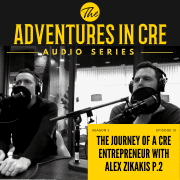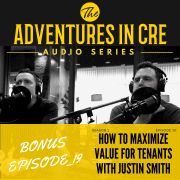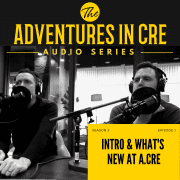Building a Diverse and Competent Team with Garland Fuller
In this episode of the A.CRE Audio Series, we’re pleased to be joined by Garland Fuller, a Diversity Recruiting Leader and Inclusion & Equity Strategist at CBRE. For this episode, we consult Garland on the best way to build a diverse team in the CRE profession.
We’re very grateful for Garland’s willingness to share their knowledge with the A.CRE audience!
Building a Diverse and Competent Team with Garland Fuller
Watch as Spencer, Sam, Tucker Wells, and Garland Fuller discuss diversity in commercial real estate.
Or Listen to this Episode
Resources from this Episode
Episode Transcript – Building a Diverse Team with Garland Fuller
Announcer (00:01):
Welcome to the Adventures in CRE Audio Series. Join Michael Belasco and Spencer Burton as they pull back the curtain on everything commercial real estate and introduce you to some of the top minds in the industry. If you want to take your skills to the next level and be part of a growing community of CRE professionals across the world, this is for you.
Sam Carlson (00:25):
All right. Well, as always, we’re excited to be back. Welcome back to the Adventures in CRE Audio Series/podcasts. I mean, in the midst of COVID, we are really a podcast, let’s be honest with ourselves at this point. I can’t wait, in fact, Spencer, I know we talk about all the time but I can’t wait until we get back and produce season three because it’s going to be fun, just get back together, produce a bunch of content and I can’t wait. So, anyway, thank you for joining us today. We’re really excited. We’ve got Garland Fuller here with us today. Garland. Thanks for coming.
Garland Fuller (00:59):
Thanks. Thank you for having me.
Sam Carlson (01:01):
Yeah, we’re excited. So Garland, we’re excited for the topic. We’re going to talk today about Growing a Diverse and Competent Team today because, I think it’s a timely topic as well as important. I mean, growing a team that is diverse and that is skilled and competent, as you say, it can make all the difference, it really can. Have you read the book, Good to Great?
Garland Fuller (01:27):
I have. It feels like a long time ago because I read it when it first came out and I know he did a second follow up book as well but I didn’t read, but yes, I’ve read it.
Sam Carlson (01:39):
So, it’s an amazing book. It’s all about, I mean, at the end of the day, the team, the members you have on that team, are huge when it comes to your ultimate success. So I’m excited to get to know you, learn from you and get your experience and to frame the conversation to Spencer. I’m going to kick it over to you and let’s get going.
Spencer Burton (02:00):
Sure. So let me first introduce Garland formally. We’re really excited to have her on. Garland is a Senior Diversity Recruiting Business Partner at CBRE. She’s been now at CBRE for a little over two years, right Garland? She’s also the podcast host and creator of the Full Circle with Garland, a great podcast about careers, especially in real estate and how to build and create and find diverse leaders. Prior to her time at CBRE, she was a Regional Recruiter for JLL, spent a little over five years at JLL. So what we love about having Garland on here first off, she speaks directly to our audience, many of which Garland are young real estate professionals looking to break into the industry. Many of our listeners are college students trying to figure out that first job or are coming out of business school and your insights… Your time at JLL now your time with CBRE, I think is really valuable.
Spencer Burton (03:03):
And the other piece here is, we’re really interested to talk about diversity. How do you create a team that has different people with different backgrounds, different ways of thinking and mold all those together in a way that that just creates a really competent team? So that’s ultimately the idea. Let me start it off, Garland with a question, as you’re going out and you’re trying to identify candidates that are unique and special and competent, how does an employer or how does a recruiter such as yourself find those individuals?
Garland Fuller (03:40):
That’s a very great question. I find that we look in places that we don’t normally look, that’s the first thing. I say, if you want to find different fish, you got to fish in different pools. When you go to the same pools, you will find the same fish. And sometimes looking, not at the schools [inaudible 00:04:02]. So, we know about the time schools that top 25 names, schools constantly [inaudible 00:04:11] after, what does that mean if you don’t go to a top school? I think sometimes people forget that financial economics are a huge part of why students pick the schools they pick. They may be able to get into some of these major top 10 schools but guess what, they may not be able to afford what those schools cost. And you can find top competent talent at public university. You can find them at state schools. You can find at maybe smaller private schools. Everyone isn’t going to Harvard, every isn’t going to Princeton.
Garland Fuller (04:51):
Does that mean that they’re not smart, they’re not content, they’re not driven, ambitious? No. It just means financially, maybe my family couldn’t afford to send me there. And I’m going to go to something that’s maybe closer to home, something that is easy and that doesn’t mean you can’t find a fantastic student who is driven, who is motivated, who has those skill sets that you’re looking for. It just means you’re probably not going to only find them at one school. So I always encourage people to, don’t discount your local college that is maybe smaller, maybe isn’t known for having a D1 football team doesn’t mean there’s not great kids there, doesn’t mean there’s not great talent there. It just means we’re needing to look a little bit deeper. I also do a lot, specifically, with student organizations. So I know career centers are great.
Garland Fuller (05:48):
They’re there for the students. There’s so many major employers in 500 there but if you only to hire a small group of students, participating in on-campus recruiting may seem like a whole lot for a very little amount that you need. So how do you get in front of students? Most of the students I know, participate in some kind of student organization. Whether that’s the real estate association or the real estate finance club or the business club, whatever that club is, you can find somewhere between 30 to 50 students, depending on how many folks they’ve got in there. And once you’re in that club, you essentially are talking specifically to the students that you want to see. You may have to sponsor the group in terms of whatever their sponsorship levels are. You may have to buy food to be the thing in the day, throw some pizza and salad or grilled food or something because everyone shows up to the meeting when there’s food. But really, can find some awesome [inaudible 00:06:56] that way, just going straight to the association into the clubs.
Spencer Burton (07:01):
And that’s from recruiters perspective. Well, let’s imagine that, you’re the of a real estate program or a business program that has as a real estate concentration and you’re not a target school and that’s always bothered me. I am fortunate to have gone to a target school as a grad student. My undergrad was not a target school and I was frustrated. It’s like this whole target school idea. How does a school that’s not a target school still get on the radar? What advice would you give to, say the director of a program that’s not a target school to get in front of the CBREs or the JLLs, the Tishman and the Hines of the world. How do those schools get in front of those employers and showcase the talent that they have that are coming out of their schools?
Garland Fuller (07:52):
That’s great. So I do quite a few, not only career nights and things like that, that are hosted by the school, but I mean, usually, it’s picking up the phone. I think oftentimes, you go to the schools that respond to you. I mean, I’ll be very honest. The smaller schools sometimes, may not have the most robust programs and people to be able to follow up with all of your needs whereas sometimes, the bigger schools, they’ve got a career center for every school, they’ve got a career and not only for the graduate school, but for the undergraduate school. And when you call, they’re usually very responsive and they’re happy to have you on campus. So I think with a smaller school, you need to really target the employers and already have in mind, the students that you think are going to be great there because you don’t want to target all of them.
Garland Fuller (08:53):
And then you only have five students who were really strong. So from your students, like where would they really want to go? And get them in front, I mean, I think, I work within the school here, Occidental College, not something that people will probably think, Occidental College is a small liberal arts school in Eagle Rock but I have a relationship with that school. Why? Well, we’ve got, a few alumni that came from that school, so they made the connection, the career center has been diligent about following up every year, like, “I want you to meet my students. I want you to see who we have here. They don’t have a real estate program, but guess what? They have an economics program that students who do participate in athletics, they do have students who are very driven, very smart, problem-solving.” Every time I show up on that campus, there’s some awesome students and are students that I hire, some that I keep in touch with and we hire later on, but that school’s on my radar because they do a very good job of following up. So I always tell schools, “you need to follow up.”
Spencer Burton (10:06):
And that’s great advice. Not all of us have the support as students, the support of the administration, we’ve run into real estate students that they’re the only student in their entire business school that’s studying real estate. Maybe a question for Tucker who knows this space really well, what can that individual do to get on the radar of the bigger firms? So they’re not at a target school and maybe they don’t have the support of their program. What can they do to get on the radar, to land a job at a great real estate company?
Tucker Wells (10:42):
Well, that’s a good question and I’m going to talk with Garland about this and ask some questions but, coming back to your question, Spencer, for example, I spoke with a student at Cal Poly. They have no real estate club. They have an econ club, they have no real estate classes. He’d been trying to break into the commercial real estate business. He’s taken Adventures in CRE, he has leveraged the podcasts. He’s leveraged the deep dives. And I think that’s a perfect way to get into the business. Finding real estate education, learning about what’s trending, learning about who the companies are and like Garland said, reaching out, picking up the phone, following up but coming back to what you said in the beginning, Garland, I want to play a scenario in front of you. So there’s five candidates, four come from those top schools, they have education in real estate. They maybe have an internship or two, they’re in the clubs, their family’s in real estate. And then there’s that fifth, from Occidental College, has none of that. How does that person stand out, especially at a CBE, JLL, where they look for that talent, out of the four to five, how does that one person stand out, I guess?
Garland Fuller (12:16):
So it’s so funny. So I think that’s why my job was created because eventually, I find the fifth candidate, that’s the person I’m putting forth to the team because they didn’t come through our traditional channels so I usually am championing them in the process. I am saying, “okay, this is who you’re going to be meeting with. This is what they’re going to probably ask you about. There’s probably going to be some kind of test. So be sure you read up on real estate finance, learn what net present value is, know what triple net is. Do know how to calculate IRR?” Like I tell them, ‘go back through that chapter. If you haven’t looked at that chapter lately, I need you to go back through that chapter to understand that because we’re going to test you and you’re going to have to know that because that test result is going to tell us whether we want to move you forward.”
Garland Fuller (13:11):
So I tell them what they need to know, in terms of that technical piece. But just how to present yourself, you need to know what to come across as a personable individual because, this is still a business, like make no, if, ands, or buts about it. You’re going to be having to connect with not only internally a variety of stakeholders but externally, you’ll be talking to a variety of people. And I’ve spoken to students who don’t come from the top schools but there’s just something there that’s very much like, they’re curious, they’re ambitious, they’re passionate. And there’s something to be [inaudible 00:13:53] student who didn’t have all the resources because they want it and they’re doing the research on their own and they’re making it happen.
Garland Fuller (14:04):
I usually also tell the students, “join ULI, join an organization because, once you get in with people in the industry and they find out you’re new, they find out you don’t know a lot of people, you instantly start to talk, connect, network, learn [inaudible 00:14:24]. You end up, sometimes getting opportunities through that. So sometimes you have to make your own opportunity. So if you don’t have a real estate club, it’s okay, start one. From what I understand, on campus, you only need three people and a signature faculty member to start a club. So, you can start the club and then, guess what? You put on your resume, “I’m president and founder of the real estate club.” So, don’t let that stop you.
Sam Carlson (14:55):
Totally. What you’re saying is gold. In fact, we’ve had a couple of people on the podcast, Justin Leah, is that right Tucker? Justin Leah came on and wasn’t he the guy that had been to like 140 different, he went to different offices in the Dallas area like a hundred…?
Tucker Wells (15:11):
That was Alex Williams.
Sam Carlson (15:12):
Alex Williams. That’s right. Alex Williams was one of those guys. And then Spencer, we had somebody on, what’s his name, Matt, we’ve done so many, sorry, Matt. He worked for that firm for free, during 2009, 10, he just said, “Hey, I’m educated, but I want to provide value first.” Was that Matt? Was that his name?
Spencer Burton (15:35):
Yeah.
Sam Carlson (15:36):
It’s so long ago, sorry. The point is, there is sitting back and waiting, right? And maybe even sharpening your skills and things like that but the idea of sitting back and waiting for something to happen or making a plan, being strategic, going out and doing those proactive things like starting a club, whatever makes the most sense for you where you’re at. Like starting a club shows initiative. Going into a hiring manager like Alex did, Oh my gosh, Alex, by the time he got done in my interview with him, by the time he got done, I think it was over six months. It was 140 visits to different hiring managers in the Dallas area. And they all… All the job opportunities happened within a week and he had four to six job offers. I could be botching that, but I know he had a bunch of job offers and he got to choose the one he wanted.
Tucker Wells (16:29):
That’s CBRE.
Sam Carlson (16:31):
That’s CBRE.
Garland Fuller (16:33):
I love it. This summer or should I say 2020 summer, when internships dissipated into thin air and everyone was sad and I said, “you still need to get the experience.” Who says you can’t do financial models certain areas of your city. You’re still going to have to know how to do the model. You don’t need to wait for an organization to say, “do this model for me.” If there are organizations out there who you would want to work for exactly, like you said for free, because right now, you’re not working and you’re not getting anything. So call somebody and say, “Hey, I just took this course. I want to put it into practice. I’ve learned some basics but I really want to work with a company where I get to see how this really works in real life. Can I work with you? You don’t have to pay me, but I definitely would love to get a recommendation from you after this is all said and done so that way I can show that I added value here.”
Garland Fuller (17:35):
And you can do that. You can totally do that. You can also get together with your friends that like this stuff and do stuff together. That’s what an organization is folks. It’s just a bunch of people who have similar interests. They like the same thing. They brainstorm, come up with ideas and now that’s what they do. And like you said, it doesn’t mean you have to wait for the internship, don’t get me wrong. Right now, they’re few and far between and they’re definitely not as many as they were three-four years ago. So instead of fighting over one thing, go create your own thing.
Spencer Burton (18:20):
I want to really get into the Power of A Diverse and Competent Team. Before I do that, I just have to say, hearing from you Garland and then hearing your role at a certain point at CBRE, what that reiterates to me is the importance of a mentor. In a way what you act as a mentor to those who don’t traditionally have a mentor and they need someone to tell them, “make sure you know IRR before your technical interview.” And others who may have come from a target school or have family with this background or friends, they already know who to turn to, to get that advice, but not everyone does. And especially those who haven’t traditionally dominated the real estate industry. A big key is to have someone that you can turn to, that you can ask questions, who can give you that advice, the advice that you’re giving and that we’re talking through here. I mean, that’s so key to be able to break into the industry.
Spencer Burton (19:16):
Now, let me pivot to the larger question around, why a Diverse and Competent Team? Now, I think most firms now recognize the value but for those who are building, who are putting in the time and effort to build a diverse and competent team and maybe for those who are skeptical, what is the value in, in your view Garland, of having a truly diverse and competent team?
Garland Fuller (19:41):
Wow. So, I’ll talk about the research and then I’ll talk about what I see every day. So the research shows that, if you have diverse teams, not only are they somewhere between 20 to 30% more profitable, they are also, in terms of the ideas that they generate, what productivity looks like, is just greater. So, it just makes good business sense, to have diverse teams. I think when you apply this to real estate, what I’m seeing on the inside is, clients show up wanting to have people who understand their products, who have used their products, who understand what their long-term goals are. And when you have a diverse team of people who have that same product in their [inaudible 00:20:34] cabinet, understand what you’re doing, are excited about what you’re doing, the passion and the interest in the ideas that get generated on your business, especially from a real estate perspective, you can just see it.
Garland Fuller (20:48):
And what I know is that, clients are changing. So, maybe before with a law firm, you show up everyone’s in suits and it works. But if you have a fashion company and it’s a woman who’s running this company and she needs an industrial building in the England Empire and you show up and have a woman industrial broker, you’re probably going to get farther, with her, you just will. Or you have to know what her interests are and be adaptable and emotionally intelligent to be able to go wherever she’s going to want to go. If you show up with a older guy, may or may not go well, you have to be, I say, reflecting your clients, you have to be reflecting the next generation, the future. I think this industry is work the way it’s worked because of the powers that be. The powers that be are starting to change.
Garland Fuller (21:49):
The globalization of this world is starting to change. When you look at the demographics of this country, it’s starting to change. And if you’re not keeping up with that, it’s really turning into an adapt or die situation. Your organization’s not evolving with the times and that includes the people that you hire, the work that you go after because you have to see the trend before it becomes the trend, right? Otherwise you’re behind at that point. And if you’re not aware of what they call generation Z and millennials are into, because they’re the largest next generation, let’s just be honest. And if you don’t know what they’re into, the businesses that have emerged because of their buying power, it wouldn’t be an Uber without that generation and you have to keep up with it and the way to do that is to make sure that you’ve got folks who understand what’s going on.
Garland Fuller (22:47):
And when you look at race, ethnicity, things like that, I think gender as well, these identifiers, these markers, you realize that, if you’re not keeping up with the trends within all groups, all communities, it’s just not going to continue to thrive as it should. So I don’t want people to think about it in a political, it’s not political. This is literally like… It’s like, when you go to the grocery store and there’s 30 different kinds of cereal, right? People go to the cereal that they like. Some like granola, some like frosted flakes, some like new slicks. So everyone’s got something there for them. This is no different than the menu of offerings that you have in your organization. If you don’t have 30 different kinds of cereal and you’re always working with two kinds, you’re totally missing out.
Sam Carlson (23:45):
Frosted flakes.
Spencer Burton (23:53):
[crosstalk 00:23:53] I really think it’s all about perspective. And what I mean by that is, so I was born in Montana and raised in Idaho. And really, my perspective, you could draw 250-mile radius around that little place that I went to high school and that was my world, right? That was the bubble that I existed in. And all of a sudden, I moved to Latin America. I moved to move to South America, actually, Venezuela. I lived in Venezuela when Chavez won his first election. Later, I lived seven years in Panama and all of a sudden, my perspective changed. And all of a sudden, I could draw a 1500 mile radius around some dots somewhere that I live. And that was not my perspective. That’s because the people that I was engaging with on a day-to-day basis, either work professionally or personally, just thought differently than I did.Spencer Burton (24:48):
And it wasn’t… And my wife and I always had the saying and when we were in Panama, if they just do things different in other places. And we created this mantra, “different isn’t bad, it’s just different.” And in fact, when you embrace the differences and there’s a lot of them in Panama and you’re living in a country totally different from the United States, there’s things that when you’re used to how they’re done in the States can be frustrating. But when you reverse the thinking and you go, “okay, this is just a different way of thinking.” And then you embrace that and you incorporate it into your own, whether it’s your own team, coming back to the business world, your own personal life. It makes for a more enriching and full life.
Spencer Burton (25:30):
And I think about a team, rather than a hundred-mile radius around one way of thinking, why not do 1500, right? And by the way, I wish I had a more global but I don’t have the time to move to everywhere in the world and my kids probably wouldn’t let me. But this idea is, as you expand your perspective, by bringing other members of the team who maybe have their own radius and all of a sudden, you create this really diverse cool way of thinking and you might argue because you have two different perspectives and this is the right way, I think, to do it and someone else says, “no, what are you talking about? This is the right way to do it.”
Spencer Burton (26:06):
But when you bring those two together and as long as there is an equal sharing of opinions and appreciation for opinions, it creates a really rich tapestry of ideas that could then push businesses for. And now back to Garland your point about 20 to 30% more profitable, I can see how that would translate to that. Anyway, a little bit of a soapbox, but a personal experience and my appreciation for broadening the perspective by bringing other people who think differently than you may think, right?
Garland Fuller (26:43):
It reminds me of a kaleidoscope, which you were saying, right? So you’ve got different colored pieces all through. And if you turn it around, you get this really cool visual. But if you only had one lens, you just don’t get it, it’s not as cool. It’s not as much to see. And it definitely is perspective taking, it’s also, like you’re saying, upbringing different backgrounds, people seeing things differently. And when everyone puts that together, you come up with a new way forward. So there’s not just one way. It’s “Oh, well, I never thought about doing it this way.” And when you collaborate to figure that out, it does usually come up with something totally different. And that’s usually what wins, got to Tell you but that’s why it works because something else is like, “Oh, this is cool, this is different.”
Sam Carlson (27:44):
And it’s funny because after hearing what Spencer was talking about. Spencer, I think about what we’re working on right now with Tavaris right. He’s from another country, his English is limited, but man, he is a phenom at coding. He’s a developer we work with. And while we have not the most perfect communication, as far as language is concerned, man, somehow he can pull out of our heads what we’re saying and he can build some of these cool things. So the dynamics that you can adopt or really inherit, bring into a team, the dynamics that are possible by focusing on diversity of a lot of things, skill sets and just diversity in general, you’re not going to get that again.
Sam Carlson (28:37):
If you are a myopic and you got the blinders on, you’re only doing business with the guys or girls that were in your club, you’re going to lose out on potential talent, potential opportunity, potential new ways of thinking, which by the way, that’s probably the biggest one. The new way of thinking, if I could look at anything over the last two years within our podcast, our content, our Adventures in CRE, the one thing, the one common thread through everything is, we’re always thinking what’s the move in front of us. How can we set the foundation now to be at that move in the future? And it comes from, I mean, we have a team of about five or six, six or seven, something like that and when we do these meetings, everybody’s bringing their input, we have different ages, different ethnicities, different languages.
Sam Carlson (29:32):
And they’re all bringing these ideas because, again, we don’t have a monopoly on ideas. And the second we think we do, is when we fall back and we become part of the crowd instead of leading the crowd, you know what I mean? And I think those dynamics and the ability for somebody to throw a concept out, there that might not be the concept but it might pair up with another concept that ends up being the idea. Right? And I think what you lose by staying, again, by saying my OPIC, by staying controlled in this small environment, is opportunity. I think you pretty much are locking yourself out of potential future opportunity, by confining yourself to something that may be comfortable but is not what is optimal in today’s work environment and business environment, for that matter. Very well said.
Spencer Burton (30:32):
I think you’re right. Garland, we’re running out of time and I want to make sure that you have the last word here. What I’m hearing is, team leaders must be deliberate about pushing for diversity and it’s not easy but it’s necessary for the growth and survival in a lot of ways of the teams. Last word of you Garland on this topic before we move on.
Garland Fuller (31:03):
I tell people, “it’s not always about culture fit, it’s sometimes about culture add.” So instead of trying to find someone that would fit in perfectly with your team, meaning, they are similar, what is it that this person would bring that you don’t already have on your team? Because if you’re looking for someone who is going to groupthink with the rest of you, it’s going to be more the same. If you’re looking for someone who… And [inaudible 00:31:35] in the interview that they’re different, because it might even brush up against your biases, as I say, right? We all have biases and we didn’t get even to that conversation, that could be a second follow-up, let’s talk about our biases. Our biases are there and then somebody rubs it and you’re like, “I don’t know. They’re not like us.”
Garland Fuller (31:55):
That should be your first inkling of, that might be something I look at more by myself. And then I look at the person and think, “what is it about them that’s different, that’s making me even feel this way and what is it that they could bring to my team? I always encourage people to, with this diversity, like you were saying, Spencer, it will be a little rough at first. It will be a little grapple at first. There will be a little friction, lean into the friction, don’t be afraid. It’s not the end of the world. You will learn something from this. The individual that you’re working with, will learn something as well. Moving forward in a space of, how can we learn from each other? That is really what we’re going to be. And then from there, you get these awesome opportunities exactly what Sam says because if someone sees something and says, “Oh yeah, I think this is a great opportunity. We should go for it for these reasons. Here’s why I think we’re great.”
Garland Fuller (32:53):
And this wasn’t even on your radar, you didn’t know anything about it but this person is making a very compelling argument for why this is the business we should be going after and why we can win it. Go with it and see where it goes because here’s what I know, oftentimes, it’s the stuff that is below the surface, the stuff that everyone’s, like you said, not what everyone’s doing but what’s the next thing. The next thing isn’t easy to see. The next thing is usually right below. And if you can’t spot it, find people who can spot it for you. And chances are, those are going to be people who don’t have the same perspective that you have.
Garland Fuller (33:33):
And it just behooves your team. It behooves everybody who you work with because it can come with that different of perspective. But for me, I live a diverse life and it comes naturally to me. It actually excites me. I really love it. But I know if that’s not been your experience at first, it might feel a little awkward. Don’t let that be what stops you. Let that be what feels you and drives you to grow. This is a lot of growing. This is a year of growth, I’m hoping, for a lot of you. So, lean into it.
Sam Carlson (34:19):
Love it. Garland very well said. Thank you for being here. You’ve been an amazing guest. Can’t say enough good things about you because this was so much fun. So we’ll have to have your back to talk about more topics and things along those lines. And if you’re listening, thank you so much for coming and we will see you on the next episode.
Announcer (34:37):
Thanks for tuning into this episode of the Adventures in CRE Audio Series. For show notes and additional resources, head over to www.adventuresandcre.com/audio series. Would you like to learn real estate financial modeling in a matter of weeks and do it with zero guesswork? If so, the A.CRE Accelerator is for you. The Accelerator is a step-by-step case-based program designed to teach you exactly what you need to know and in the order you need to know. So you can gain both the knowledge and experience to take your career to the next level. To see if the accelerator is right for you, go to www.adventuresincre.com/accelerator.








